 W
WAbigail Adams was the wife and closest advisor of John Adams, as well as the mother of John Quincy Adams. She is sometimes considered to have been a Founder of the United States, and is now designated as the first Second Lady and second First Lady of the United States, although these titles were not used at the time. She and Barbara Bush are the only two women to be the wife of one U.S. president and the mother of another.
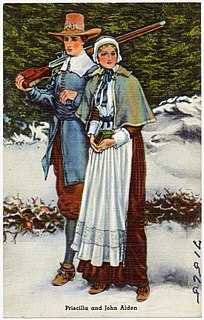 W
WPriscilla Alden was a noted member of Massachusetts's Plymouth Colony of Pilgrims and the wife of fellow colonist John Alden. They married in 1621 in Plymouth.
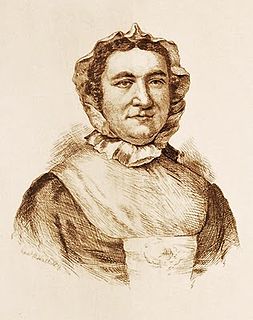 W
WMary Spratt Provoost Alexander was an influential colonial era merchant in New York City.
 W
WSarah "Sally" Franklin Bache was the daughter of Benjamin Franklin and Deborah Read. She was a leader in relief work during the American Revolutionary War and frequently served as her father's political hostess, like her mother before her death in 1774. Sarah was also an important leader for women in the pro-independence effort in Philadelphia. She was an active member of the community until her death in 1808.
 W
WAnne Bradstreet was the most prominent of early English poets of North America and first writer in England's North American colonies to be published. She is the first Puritan figure in American Literature and notable for her large corpus of poetry, as well as personal writings published posthumously.
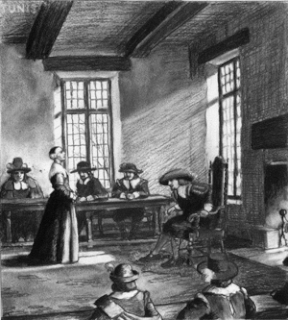 W
WMargaret Brent, was an English immigrant to the Colony of Maryland, settled in its new capitol, St. Mary's City, Maryland. She was the first woman in the English North American colonies to appear before a court of the common law. She was a significant founding settler in the early histories of the colonies of Maryland and Virginia. Leonard Calvert, Governor of the Maryland Colony, appointed her as the executrix of his estate in 1647, at a time of political turmoil and risk to the future of the settlement. She helped ensure soldiers were paid and given food to keep their loyalty to the colony, thereby very likely having saved the colony from violent mutiny, although her actions were taken negatively by the absentee colonial proprietor in England, Cecil Calvert, the second Lord Baltimore, and so ultimately she paid a great price for her efforts and was forced to leave the colony.
 W
WEsther Edwards Burr was the mother of U.S. Vice President Aaron Burr, Jr. and the wife of Princeton University President Aaron Burr, Sr. whom she married in 1752. Her journal records her perspectives on her daily activities and current events; it is important in studies of American history and literature.
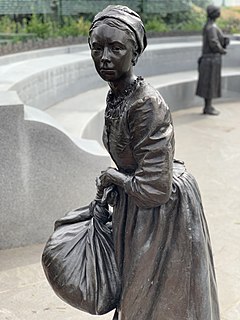 W
WAnne Burras was an early English settler in Virginia and an Ancient Planter. She was the first English woman to marry in the New World, and her daughter Virginia Laydon was the first child of English colonists to be born in the Jamestown colony. Anne Burras arrived in Jamestown on September 30, 1608, on the Mary and Margaret, the ship bringing the Second Supply. She came as a 14-year-old maid to Mistress Forrest. In November or December 1608, Anne married John Laydon/Layton/Leyden. The Laydons had four daughters, Virginia, Alice, Katherine, and Margaret. All six members of the Laydon family were listed in the muster of February 1624/5. According to the muster, Anne was 30 years of age when the muster was taken. All four children are listed as born in Virginia; their ages are not given.
 W
WMary Campbell was an American colonial settler, taken captive as a child by Native Americans during the French and Indian War. Later rescued, she is believed to have been the first white child to travel to the Western Reserve.
 W
WEunice Cole, maiden name unknown, was a woman from the coast of New Hampshire. Better known as "Goody Cole", she is the only woman convicted of witchcraft in New Hampshire.
 W
WSusanna Cole was the lone survivor of an American Indian attack in which many of her siblings were killed, as well as her famed mother Anne Hutchinson. She was taken captive following the attack and held for several years before her release.
 W
WMartha Corey was accused and convicted of witchcraft during the Salem witch trials, on September 9, 1692, and was hanged on September 22, 1692. Her second husband, Giles Corey, was also accused.
 W
WVirginia Dare was the first English child born in a New World English possession.
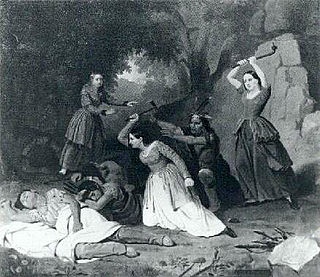 W
WHannah Duston was a colonial Massachusetts Puritan mother of nine who was taken captive by Abenaki people from Québec during King William's War, with her newborn daughter, during the Raid on Haverhill in 1697, in which 27 colonists were killed. While detained on an island in the Merrimack River in present-day Boscawen, New Hampshire, she killed and scalped ten of the Native American family members holding them hostage, with the assistance of two other captives. She claimed the Abenaki had killed her baby during the journey to the island.
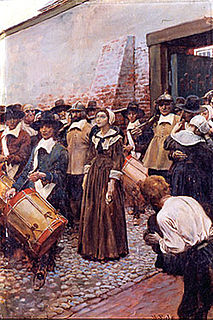 W
WMary Dyer was an English and colonial American Puritan turned Quaker who was hanged in Boston, Massachusetts Bay Colony, for repeatedly defying a Puritan law banning Quakers from the colony. She is one of the four executed Quakers known as the Boston martyrs.
 W
WElizabeth Booth was born in 1674 and was one of the accusers in the Salem Witch Trials. She grew up in Salem, Massachusetts, as the second eldest of ten children. When she was sixteen she was accused of being a witch. When she was eighteen, she began accusing people of practicing witchcraft, including John Proctor, Elizabeth Proctor, Sarah Proctor, William Proctor, Benjamin Proctor, Woody Proctor, Giles Corey, Martha Corey, Job Tookey, and Wilmont Redd. Five of these people were executed due to Booth's testimony. Elizabeth Proctor would have been executed as well if she was not pregnant. After the Witch Trials, Booth married Israel Shaw on December 26, 1695, and had two children named Israel and Susanna. Booth's death date is unknown.
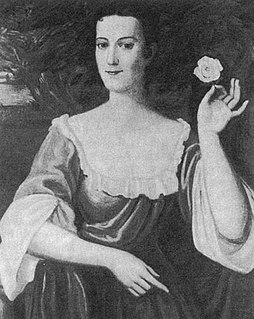 W
WSally Cary Fairfax was the wife of George William Fairfax (1724–1787), a prominent member of the landed gentry of late colonial Virginia. As such, she was mistress of the Virginia plantation and estate of Belvoir. She is well-remembered for being the woman George Washington was apparently in love with just before his marriage to Martha Dandridge Custis.
 W
WBilhah Abigail Levy Franks was an English–born Jewish woman who lived most of her life in the Province of New York, British America. Born in London and raised in New York City, she married a London-born slave merchant and reared a family of nine children. While committed to Jewish observance, she and her family also socialized freely in the wider Christian society. Theirs was considered one of the prominent families of colonial New York.
 W
WElizabeth Freeman, also known as Bet, Mum Bett, or MumBet, was the first enslaved African American to file and win a freedom suit in Massachusetts. The Massachusetts Supreme Judicial Court ruling, in Freeman's favor, found slavery to be inconsistent with the 1780 Massachusetts State Constitution. Her suit, Brom and Bett v. Ashley (1781), was cited in the Massachusetts Supreme Judicial Court appellate review of Quock Walker's freedom suit. When the court upheld Walker's freedom under the state's constitution, the ruling was considered to have implicitly ended slavery in Massachusetts.Any time, any time while I was a slave, if one minute's freedom had been offered to me, and I had been told I must die at the end of that minute, I would have taken it—just to stand one minute on God's airth [sic] a free woman— I would.
 W
WSarah Good was one of the first three women to be accused of witchcraft in the Salem witch trials, which occurred in 1692 in colonial Massachusetts.
 W
WAnn Hibbins was a woman executed for witchcraft in Boston, Massachusetts, on June 19, 1656. Her death by hanging was the third for witchcraft in Boston and predated the Salem witch trials of 1692. Hibbins was later fictionalized in Nathaniel Hawthorne's famous novel The Scarlet Letter. A wealthy widow, Hibbins was the sister-in-law by marriage to Massachusetts governor Richard Bellingham. Her sentence was handed down by Governor John Endicott.
 W
WAnne Hutchinson was a Puritan spiritual advisor, religious reformer, and an important participant in the Antinomian Controversy which shook the infant Massachusetts Bay Colony from 1636 to 1638. Her strong religious convictions were at odds with the established Puritan clergy in the Boston area and her popularity and charisma helped create a theological schism that threatened to destroy the Puritans' religious community in New England. She was eventually tried and convicted, then banished from the colony with many of her supporters.
 W
WMercy Lewis was an accuser during the Salem Witch Trials. She was born in Falmouth, Maine. Mercy Lewis, formally known as Mercy Allen, was the child of Philip Lewis and Mary (Cass) Lewis.
 W
WDeborah, Lady Moody is notable as the founder of Gravesend, Brooklyn, and is the only woman known to have started a village in colonial America. She was the first known female landowner in the New World. As a wealthy titled woman, she had unusual influence in New Netherland, where she was respected. In the Massachusetts Bay Colony, where she had first settled after leaving England because of persecution as an Anabaptist, she had been described by contemporaries as "a dangerous woman" and chose excommunication over giving up her beliefs.
 W
WRebecca Brewton Motte (1737–1815) was a plantation owner in South Carolina and townhouse owner in its chief city of Charleston. She was known as a patriot in the American Revolution, supplying continental forces with food and supplies for five years. By the end of the war, she had become one of the wealthiest individuals in the state, having inherited property from both her older brother Miles Brewton, who was lost at sea in 1775, and her husband Jacob Motte, who died in 1780.
 W
WElizabeth Pabodie (1623–1717), also known as Elizabeth Alden Pabodie or Elizabeth Peabody, was allegedly the first white child born in New England.
 W
WHannah Callowhill Penn was the second wife of Pennsylvania founder William Penn; she effectively administered the Province of Pennsylvania for six years after her husband suffered a series of strokes and then for another eight years after her husband's death. She served as acting proprietor from 1712 until her death in 1726.
 W
WElizabeth Poole or Pole was an English settler in Plymouth Colony who founded the town of Taunton, Massachusetts. She was the first woman known to have founded a town in the Americas.
 W
WAnn Pudeator was a well-to-do septuagenarian widow who was accused of and convicted of witchcraft in the Salem witch trials in colonial Massachusetts. She was executed by hanging.
 W
WAnn Putnam , along with Elizabeth Hubbard, Mary Walcott, Mercy Lewis, Abigail Williams and Mary Warren |Abigail Williams]], was an important witness at the Salem Witch Trials of Massachusetts during the later portion of 17th-century Colonial America. Born 1679 in Salem Village, Essex County, Massachusetts Bay Colony, she was the eldest child of Thomas (1652–1699) and Ann Putnam (1661–1699).
 W
WDeborah Read Franklin was the common-law wife of Benjamin Franklin, polymath and one of the Founding Fathers of the United States.
 W
WElizabeth Griscom Ross, née Griscom, also known by her second and third married names, Ashburn and Claypoole, was an American upholsterer who was credited by her relatives in 1870 with making the first American flag, accordingly known as the Betsy Ross flag. Though most historians dismiss the story, Ross family tradition holds that General George Washington, commander-in-chief of the Continental Army and two members of a congressional committee—Robert Morris and George Ross—visited Mrs. Ross in 1776. Mrs. Ross convinced George Washington to change the shape of the stars in a sketch of a flag he showed her from six-pointed to five-pointed by demonstrating that it was easier and speedier to cut the latter. However, there is no archival evidence or other recorded verbal tradition to substantiate this story of the first American flag. It appears that the story first surfaced in the writings of her grandson in the 1870s, with no mention or documentation in earlier decades.
 W
WMargaret Scott was found guilty of witchcraft during the Salem witch trials and was executed by hanging on September 22, 1692. She was part of the last group to be executed, which also included Mary Eastey, Martha Corey, Ann Pudeator, Samuel Wardwell, Mary Parker, Alice Parker, and Wilmot Redd. She was the only accused person from Rowley to be executed. As a lower-class, long-term widow, having lost several children in infancy, she was a prototypical witch candidate. When her husband, Benjamin, died, he left a very small estate and she, being unable to remarry, was reduced to begging, which invited resentment and suspicion. In this manner, her circumstances were comparable to fellow victim Sarah Good.
 W
WMargaret "Peggy" Shippen was the highest-paid spy in the American Revolution, and was the second wife of General Benedict Arnold.
 W
WAbigail "Nabby" Amelia Adams Smith was the daughter of Abigail and John Adams, founding father and second President of the United States, and the sister of John Quincy Adams, sixth President of the United States. She was named for her mother.
 W
WPenelope Van Princis Kent Stout of Amsterdam, Netherlands. Was the first female white settler of Monmouth County, New Jersey. According to History of the Baptists she lived to the age of 110.
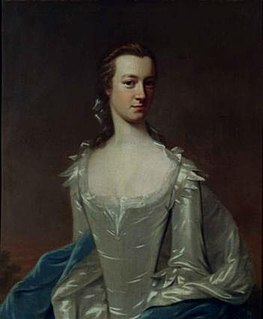 W
WMargaret Wake Tryon was an English heiress. She was the wife of William Tryon, who served as the Colonial Governor of North Carolina and the Colonial Governor of New York. The namesake of Wake County in North Carolina, she is one of three women, along with Charlotte of Mecklenburg-Strelitz and Virginia Dare, to have a North Carolinian county named after her. She was known for her interest in military strategy, which was controversial for upper-class women of her time.
 W
WNanyehi, known in English as Nancy Ward, was a Beloved Woman and political leader of the Cherokee. She advocated for peaceful coexistence with European Americans and, late in life, spoke out for Cherokee retention of tribal lands. She is credited with the introduction of dairy products to the Cherokee economy.
 W
WMartha Washington was the wife of George Washington, the first President of the United States. Although the title was not coined until after her death, Martha Washington served as the inaugural First Lady of the United States. During her lifetime, she was often referred to as "Lady Washington".
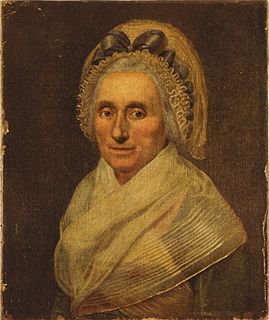 W
WMary Washington, was the second wife of Augustine Washington, a planter in Virginia, and the mother of George Washington, the first President of the United States, and five other children. Washington lived a large part of her life in Fredericksburg, Virginia, where many monuments were erected in her honor and a university plus other public buildings bear her name.
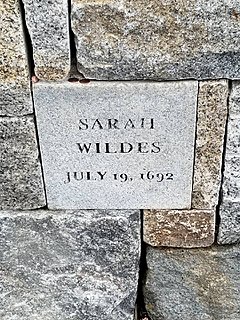 W
WSarah Wildes was wrongly convicted of witchcraft during the Salem witch trials and was executed by hanging. She maintained her innocence throughout the process, and was later exonerated. Her husband's first wife was a member of the Gould family, cousins of the Putnam family, the primary accusers, and court records document the family feuds which led to her persecution.
 W
WElizabeth Wilson was an American whose execution by hanging for the purported murder of her children in southeastern Pennsylvania during the immediate post-Revolutionary War period made her a folklore figure in the late eighteenth and early nineteenth century. Although her responsibility for the children's deaths had not been definitively established, the hanging was carried out and a pardon, granted by the state and entrusted to her brother, William, was not delivered in time to stop the execution. There was tremendous popular interest in her story, which quickly evolved into a tale of moral failing and divine redemption. Following his sister's death, William became a recluse, popularly known as The Pennsylvania Hermit.